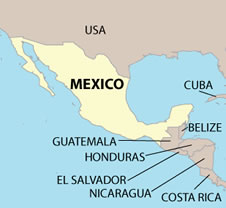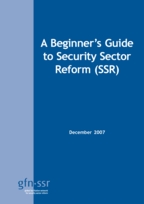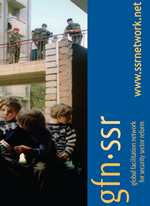
-
Top-down and bottom-up approaches to police reform in Mexico
-
SSR in Latin America and the Caribbean
-
Useful links for SSR in Mexico
-
GFN-SSR Document Library
Top-down and bottom-up approaches to police reform in Mexico
Crime and social violence have been consistently on the rise in Mexico during the last ten years. A wide and intricate array of social, economic and political conditions lay behind such phenomena. One of the most significant political setbacks is a notorious underdevelopment of democratic procedures and practices in Mexican law enforcement bodies. Police reform remained a forsaken subject during most of the 20th century when an authoritarian regime ruled in Mexico. Presently, a process of comprehensive and sustainable police reform is, in fact, one of the most deferred components of State reform in the Mexican transition to democracy. Mexican citizens rate police officers at the lowest position in opinion polls that assess trust in governmental authorities, often struggling for that position only with legislators. Lack of integrity, violent relations with the communities, irrational use of force and the systematic violation of civil rights rank among the top irregularities in police performance.
A major effort to reform federal police bodies has been in process since the year 2000, being carried out by the federal administration in Mexico, backed with hefty budget allocations to improve equipment, training, technology and intelligence capabilities. However, federal police officers constitute roughly 5 per cent of the total police population in the country (made up of over 400,000 sworn officers), and their activities focus mainly in combating organised crime (drug dealing, human trafficking, kidnapping and so on). Therefore, federal police officers hardly have regular contact with citizens. The vast majority of the police population in Mexico is made of (mostly poorly equipped and trained) sworn officers who serve in municipal and state police bodies. Local police officers are the ones involved in day-to-day contact with citizens. Their recurrent abuses and lack of responsiveness and adequate training impair the image of their profession.
It is also important to acknowledge that since 2007 there have been increasing federal budgetary allocations earmarked for the improvement of law enforcement capacities at the municipal level in Mexico. However, such funds are not tied to efficient accountability mechanisms that would ensure sustainable and democratic police reform nationwide. In addition to the limitations of the top-down efforts for police reform in Mexico, there is a current public and national security strategy that favours a frontal attack on organised mobs (based on militarisation and repression), whilst marginalising crime prevention (social and situational).
Nevertheless, despite all the odds mentioned above, at least three municipalities in Mexico (out of roughly 2,500) have experienced progressive democratic police reform and crime prevention initiatives that have been successfully implemented and sustained for more than two local administrations. Most of these initiatives in Mexico fail to survive after a change in local administration (municipal administrations last three years, re-election is not allowed). So it is particularly interesting to study why the experiences in Chihuahua, Ciudad Nezahualcóyotl and Naucalpan have been so unusually successful. These experiences share the following four elements: meaningful citizen/community participation; normative/legislative reform; measures to ensure the respect of the rights of citizens and law enforcement officers alike; and internal and external controls of policing bodies (accountability mechanisms). The further study of the lessons learned and good practices in these cases will generate key information to avoid regressive trends in these municipalities in the future, and will provide policy makers in other Mexican municipalities with relevant and concrete examples on how to embark in sustainable police reform.
For further information, please contact:
Professor Juan Salgado
Legal Studies Department
CIDE
Mexico
SSR in Latin America and the Caribbean
This Topic Guide highlights key regional texts and resources that cut across a number of security sectors and countries. Because of the size of the region, several broadly representative country case studies from sub-regions have been selected to highlight particular issues of interest. Whilst not exhaustive, this guide gives an indication of the growing literature available on SSR in the region.
Useful links for Mexico
- BBC Country Profile
- Secretaria de la Defensa Nacional (Ministry of Defence)
- Government of Mexico
- Mexico Foreign Ministry
- Office of the Attorney General
- UNDP – Mexico
- Woodrow Wilson International Centre for Scholars – Mexico Institute
- Centre for Strategic and International Studies
- Comunidad Segura
- Facultad Latinoamericana de Ciencias Sociales (FLACSO)
GFN-SSR Document Library
The Document Library contains links to a number of SSR related documents either focussing specifically on SSR in Mexico looking at the country alongside others as a case study. A selection of these are listed below:
- The Merida Initiative and Citizen Security in Mexico and Central America
What effect will the United States’ Merida Initiative have on security in Mexico and Central America? How effective will the aid package be in tackling drug-trafficking and gang-related violence? This briefing from the Washington Office on Latin America examines the Merida Initiative. It argues that the Initiative alone will not reduce drug flow into the US and should not be judged on that basis. The Initiative should instead be judged by its effect on citizen security and civilian security institutions in Mexico and Central America. - Mexico’s National Human Rights Commission: A Critical Assessment
Mexico’s official human rights organ, Comision Nacional de los Derechos Humanos (CNDH), is failing to promote reforms to improve Mexico’s dismal human rights record. What has gone wrong? This research, by Human Rights Watch, argues that the CNDH could play a far more active role but it has been limited by its own policies and practices. For such an institution to be a catalyst for change, rather than a chronicler of the status quo, it must be proactive and persistent in promoting solutions. - At a Crossroads: Drug Trafficking, Violence and the Mexican State
How can drug trafficking between the US and Mexico be reduced? This Washington Office of Latin America and Beckley Foundation Drug Policy Programme brief examines current and past drug policies implemented by the Mexican government and argues that government responses dominated by law enforcement and militarisation do little to address the issue in the long-term. The most effective way to address drug trafficking is through increased efforts to curb demand for illicit drugs in the United States and Mexico. - Policing, Regime Change, and Democracy: Reflections from the Case of Mexico
How can Iraq learn from Mexico’s attempts to mount new policing operations and restore order after the 1910 Revolution? This study by the Crisis States Research Centre describes how the challenges of policing regime change in post-dictatorship Mexico laid the foundation for descent into chaos. When new regimes have been born out of violent conflict it is unwise to rush into constitutional reforms that give police power. In Iraq, building state institutions and making them accountable is likely to work better than constitutionally enhancing police powers. - Reforming the Ranks: Drug Violence and Police Reform in Mexico
Mexico’s drug violence is increasing. Its police are ineffective and corrupt. The Calderón government has responded by calling out the army. But is this the right way forward? This paper by the Washington Office on Latin America argues that the government needs to restore public order, combat corruption and begin comprehensive reform of the police and criminal justice system. The American government should support reforms and do more to curb arms trafficking into Mexico as well as American demand for illicit drugs. - The Mexican Armed Forces in Transition
Despite past problems, the Mexican armed forces have made significant progress towards becoming professional institutions. This study, from Queens University, examines the history and structure of the Mexican armed forces and suggests areas of possible military cooperation between Canada and Mexico. It looks at the process of political change and the effects this has had on civil-military relations. The armed forces are well-trained and dynamic organisations that are respected by Mexicans and, although they could liberalise further, they are adapting well to democratic change. - Latin America and the Caribbean: Domestic and Transnational Insecurity
How is Latin America and the Caribbean coping with the non-traditional security challenges it faces? This paper examines the two key axes of security dynamics: weak governance and citizen insecurity, and trans-national organised crime. It explores their interlinkages and evaluates coping mechanisms. It identifies the most likely future security scenarios in the region and suggests a number of ways in which regional insecurity might be addressed more effectively. However, the development of a common security agenda remains an elusive goal. - Report on the Security Sector in Latin America and the Caribbean
What is the experience of security sector reform in Latin America and the Caribbean since the return to democracy? What are the security reform issues specific to the region? This report by the Facultad Latinoamerica de Ciencias Sociales, Chile (FLACSO-Chile) analyses security policy and reform in defence, public security, and intelligence in 20 countries in Latin America and the Caribbean. It finds that security sector institutions have struggled to adapt to newly installed democratic regimes and operate in parallel to governments. Limiting their autonomy and using an integrated framework in considering reform is necessary to develop security institutions that support democracy.









